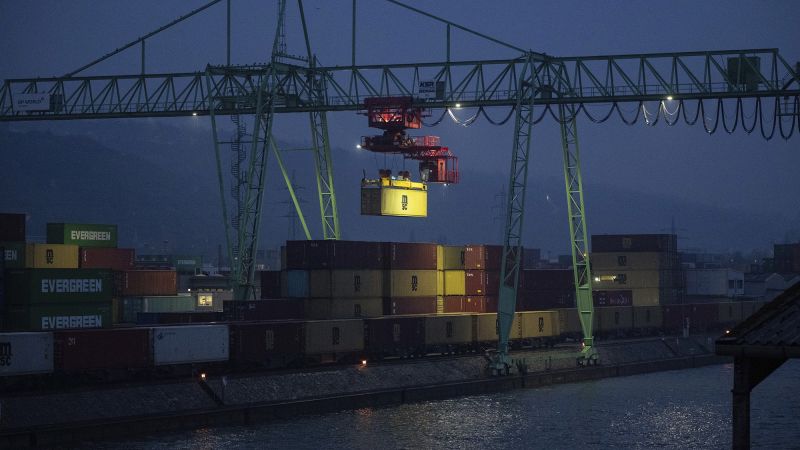
Germany's Economic Crossroads: Navigating Challenges Amid Trump's Tariffs
As Germany stands on the brink of pivotal changes in its political landscape, the nation's economy finds itself at a critical juncture. The upcoming elections, set against the backdrop of escalating economic tensions induced by tariffs from the United States under former President Donald Trump, create an intricate scenario. The economic repercussions impose challenges that require Germany to adapt and innovate. Here, we explore the impacts of these tariffs on Germany's economy and the potential strategies it can employ to forge a successful path forward.
The Current Economic Landscape
Historically a powerhouse in Europe, Germany's economy is well-known for its robust industrial base and a strong export sector. However, recent global trends and geopolitical tensions have impeded its steady growth. The imposition of tariffs by the U.S. during Trump's administration has exacerbated these issues, affecting key sectors like automotive and manufacturing.
The immediate result of the tariff imposition has been increased production costs for German manufacturers, making their products significantly less competitive in the U.S. market. This, coupled with the ongoing energy transition and digital transformation challenges, has created a complex environment for businesses to navigate.
The Political Dimension: Elections and Economic Policies
The upcoming elections in Germany introduce a new variable that could pivot the nation's economic direction significantly. With various parties proposing different strategies to address the economic strain, the outcome of these elections will determine the future policies concerning international trade and domestic economic growth.
The leading political parties have outlined distinct approaches. Some advocate for stronger ties with European allies to counterbalance the U.S. tariffs, while others propose increased investment in innovation and sustainable technologies to revitalize Germany’s industrial prowess.
Impact of U.S. Tariffs on German Industries
The automotive industry, a cornerstone of Germany's export economy, has been notably impacted by the tariffs. With the U.S. being one of the largest markets for German cars, increased tariffs have caused a downturn in exports, leading to reduced revenues and job cuts. This has been compounded by the shift towards electric vehicles and the need for significant investment to stay competitive in the evolving global automotive market.
Furthermore, the machinery and equipment sector, another critical component of Germany's export economy, is experiencing similar challenges. With higher tariffs, German machinery becomes less attractive to U.S. importers, forcing companies to look for alternatives or absorb costs, impacting profitability.
Strategies for Economic Revitalization
To navigate through these turbulent economic times, Germany needs a multifaceted strategy that balances immediate relief with long-term growth goals.
Strengthening European Alliances
One viable option is to strengthen Germany's ties within the European Union. By fostering deeper economic relationships, Germany can mitigate the impact of U.S. tariffs by boosting intra-European trade. This involves not only tariff reductions but also improving competitive advantages through joint technological and industrial projects.
Investing in Innovation and Green Technologies
Investing in innovation and sustainable technologies could serve as a pivotal strategy in revitalizing Germany's economy. By promoting research and development in green energy, digital transformation, and advanced manufacturing, Germany can position itself as a leader in next-generation technologies. This not only enhances export potential but also aligns with global trends towards sustainability.
Diversification of Export Markets
Another key tactic is the diversification of export markets. By reducing dependency on the U.S. market, Germany can explore emerging markets in Asia, Africa, and Latin America. Expanding trade agreements with these regions could open new avenues for growth, ensuring that the economy remains resilient to external pressures like tariffs.
The Role of Innovation in Overcoming Economic Challenges
Innovation will play a critical role in overcoming the economic challenges Germany faces. With a strong emphasis on digital transformation and technology development, German industries can improve efficiency and productivity, making them more resilient to fluctuations in international trade policies.
Government incentives and support for startups and tech companies can stimulate the economy by fostering a culture of innovation. This not only addresses current economic challenges but also lays the foundation for sustainable growth in the future.
Conclusion
In conclusion, Germany stands at a crossroads characterized by both challenges and opportunities. The upcoming elections will be a turning point, determining how the nation responds to the economic strain brought on by external tariffs and internal transitions. Through strategic investment in innovation, stronger European partnerships, and market diversification, Germany can navigate these challenges successfully.
The journey ahead requires cohesive efforts from political leaders, businesses, and the workforce to ensure that Germany not only withstands the current adversities but emerges stronger and more resilient. With the right strategies in place, Germany can secure its position as a leader in the global economy, adapting to and overcoming the challenges posed by shifting international trade dynamics.

